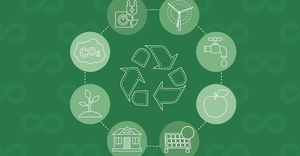Retailer's recycling rate reaches 77 percent in 2010.
June 30, 2011
By Allan Gerlat, Contributing Writer
Menomonee Falls, Wis.-based Kohl’s Department Stores may have issued its first sustainability report in May 2011, but the large retailer is no newcomer to sustainability. For years, the retailer has tried to improve its environmental footprint by focusing on energy efficiency, green building design and operation, greenhouse gas emissions, and the environmental decisions of its stakeholders.
Of particular interest to waste industry professionals and observers, the company has seen great success in its waste reduction and recycling efforts. It has posted high recycling rates for several years and also has received recognition from the U.S. Environmental Protection Agency (EPA) as a leader in the purchasing and use of recycled products.
The Facts
In 2007, Kohl’s posted a recycling rate of 73.1 percent. By 2010, the recycling rate had climbed to 77 percent. That’s an impressive number, but still short of the goal the company had set for the year: 85 percent. The bulk of what Kohl’s recycled last year — 79 percent, to be exact — was cardboard and paper. Construction debris, plastics, wood, metal, bottles/cans and electronics were among the other recycled materials.
Carpet recycling is a particular area of emphasis for Kohl’s. Over the years, the company has recycled old carpet from 26 remodeled stores, diverting a total of 910,000 pounds of the material from landfills in the process. In 2010 alone, Kohl’s recycled more than 357,500 pounds of used carpet from remodeled stores. At newly built Kohl’s stores, the building materials contain about 20 percent recycled content.
Kohl’s pushes for recycled content in many of its products when it’s cost-effective, saving not only landfill space but energy, water, oil and trees, the company says on its website. For example, the store’s gift boxes and restroom papers consist of 100 percent recycled content, and its merchandise bags feature up to 35 percent. The retailer’s plastic shopping bags contain more recycled content than a standard white bag, hence the gray color.
The retailer also works on waste prevention. In 2008, Kohl’s introduced reusable shopping bags to encourage customers to reduce the number of bags used. The company also invites shoppers to bring plastic bags to any Kohl’s stores to recycle.
Effect on the Waste Industry
In addition to its own internal efforts, Kohl’s also works with suppliers to reduce the amount of packaging used and increase the units shipped per carton, taking millions of cartons out of the loop. The move eliminates both labor and waste at its stores, Kohl’s said. Items that do require plastic protection are shipped in polyethylene bags that can be easily recycled.
In 2010, the EPA’s WasteWise program gave Kohl’s a Gold Achievement Award for Green Purchasing for the company’s purchase and use of recycled materials. “We aim to make environmentally responsible choices when it comes to the materials we use, how we use them and how we transport them,” said Ken Bonning, Kohl’s executive vice president of store planning and logistics, in a press release announcing the award. “While waste reduction initiatives like our recycling program and shipping efficiencies are beneficial for our business, we’re inspired by their positive, long-term environmental benefit.”
Sustainability efforts such as Kohl’s provide opportunities for solid waste companies “as long as the waste industry doesn’t lose control of the waste stream,” says Michael Hoffman, a waste industry analyst who serves as the director of research and a managing director for Memphis, Tenn.-based Wunderlich Securities.
In fact, in many cases, it’s been the waste industry that’s spurred environmental moves by the large retailers, Hoffman says. “Garbage guys showed up and said, ‘Let me show you how to do it smarter,’” he says.
However, Hoffman is skeptical in general about the real business impact of “being green” on retailers. “I don’t think the consumer is saying, ‘I won’t go to Wal-Mart if they don’t have a sustainability plan.’” Retailers like Kohl’s can make some gains by communicating a green message — for a while, he says. “But will everybody stay the course when the message starts losing its effectiveness?” Hoffman says.
Investors are indifferent about being green, Hoffman adds. “Wall Street doesn’t really care about sustainability reports. It’s all public relations.”
Ultimately, the waste industry will keep in step with whatever way the wind is blowing with retailers, Hoffman says. “They’re perfectly comfortable to do whatever the customer wants and get paid appropriately for it.”
Allan Gerlat is a Sagamore Hills, Ohio-based contributing writer.
You May Also Like


